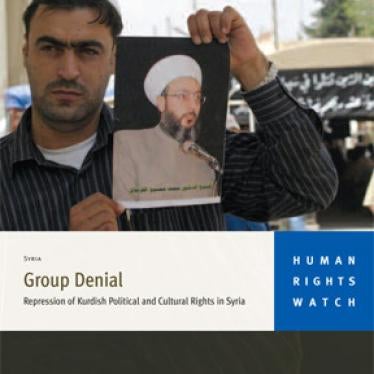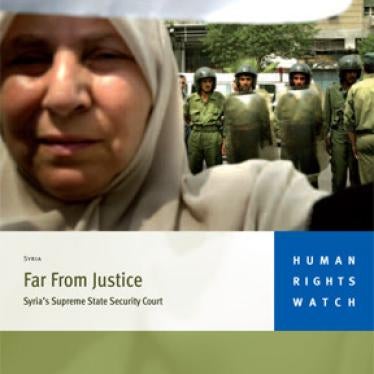(New York) – Catherine Ashton, the EU foreign relations chief, should raise human rights concerns with Syrian officials during her visit next week and seek specific commitments to improve their record, Human Rights Watch said today. So far, the increased Western engagement with Syria has not resulted in any human rights gains because the US and Europe have failed to press the issue, Human Rights Watch said.
In the last three months, as Western officials reached out to Syria, its security services have detained numerous human rights activists, journalists, and students who tried to exercise their rights to free expression and assembly. In February alone, Prime Minister Francois Fillon of France and US Under Secretary of State for Political Affairs William Burns have visited Damascus.
“As the last few months have demonstrated, talking to Syria without putting its rights record on the table emboldens the government to believe that it can do whatever it wants to its people, without consequence,” said Sarah Leah Whitson, Middle East director at Human Rights Watch. “A message to Syria that says ‘We only care about your external affairs’ is a green light for repression.”
On March 2, 2010, Military Intelligence in Aleppo stormed the apartment of Abdel Hafez Abdel Rahman, a board member of the unlicensed Kurdish human rights group MAF (“Right” in Kurdish), and detained him with another MAF board member, Nadera Abdo. Other members of the group said that the detention is tied to Abdel Rahman’s activities for the group MAF. While the security services released Abdo on March 6, Abdel Rahman remains in detention.
Security services have also detained bloggers, journalists, and writers. On December 27, 2009, State Security called in Tal al-Mallohi, 19, a secondary school student, for interrogation, reportedly for articles she wrote and distributed on her blog. A few days later, the security services confiscated her computer and detained her. A Syrian human rights activist told Human Rights Watch that she remains in detention. Human Rights Watch was unable to determine what article the security forces deemed objectionable.
On November 22, State Security detained without explanation Ma`en `Akel, a journalist at the newspaper Thawra. Syrian activists following the case said `Akel apparently was detained for investigating government corruption. Security forces finally released him on February 23 without charging him with a crime. On January 7, security forces detained another journalist, Ali Taha, and a photographer, Ali Ahmad, in the Sayyida Zaynab neighborhood of Damascus. They were released on February 7, without having been charged. Both work for the satellite TV station Rotana, which mainly focuses on social life topics.
On February 10, border police detained Ragheda Sa`id Hasan, who had been a political prisoner in the 1990s for her Communist Action Party membership, as she tried to cross into Lebanon. Three days later, unidentified individuals entered her apartment and confiscated a copy of “The New Prophets,” a manuscript in which she describes her experience as a political detainee, as well as publications issued by various Syrian opposition parties. She remains in detention.
“A government that fails to respect the rights of its citizens can’t be counted on to respect any other international obligation, to anyone,” Whitson said. “Ending the persecution of Syrian citizens should be part and parcel of any plan to rehabilitate this government from its isolation.”
Two detained human rights lawyers, Muhannad al-Hasani, president of the Syrian Human Rights Organization (Swasiah) and Haytham al-Maleh, a 79-year-old prominent human rights lawyer who has been jailed repeatedly, are on trial. On February 18, al-Hasani appeared before a Damascus criminal court for interrogation on charges of “weakening national sentiment” and “spreading false or exaggerated information” in connection with his monitoring of the Supreme State Security Court (SSSC), a special court with almost no procedural guarantees.
Al-Maleh appeared before a military judge on February 22 to face new charges of “insulting the president” and “slandering a governmental body.” According to his family, his health is failing since the `Adra prison authorities stopped allowing families to bring medication to inmates on February 11. Al-Maleh, who has diabetes and an overactive thyroid, has refused the prison pharmacy’s medicine because he believes the medicine is of poor quality.
“While Syrian officials are chatting up Western diplomats in their gilded front parlors, they’re jailing anyone who dares to utter a critical word in their basement prison cells,” Whitson said.
Security forces also have cracked down on political activists, particularly Kurdish leaders. On December 26, Political Security detained four prominent members of the Kurdish party Yekiti: Hassan Saleh, Muhammad Mustapha, Ma`ruf Mulla Ahmad, and Anwar Naso. All four remain in incommunicado detention. In a recent report, Human Rights Watch documented the increased repression of Syria’s Kurds following large-scale Kurdish demonstrations in March 2004.
The Syrian authorities also are expanding their travel bans on activists. On February 24, security services prevented Radeef Mustapha, the head of the board of the Kurdish Human Rights Committee, and the coordinator of the Syrian Coalition to Combat the Death Penalty, from traveling to Geneva to attend the fourth annual conference to combat the death penalty. According to a February 2009 study published by the Syrian Center for Media and Freedom of Expression, at least 417 political and human rights activists are banned from traveling.
“We are back to the bad old days where you have to watch every word you say,” a Syrian lawyer who wished to remain anonymous told Human Rights Watch over the phone.








